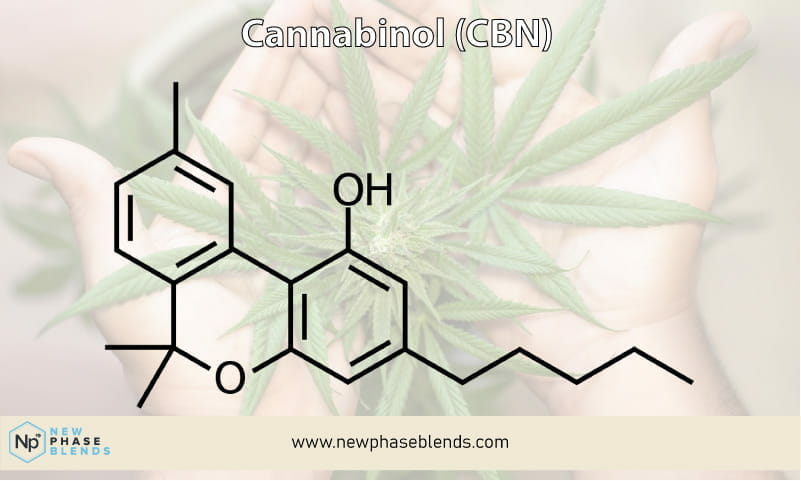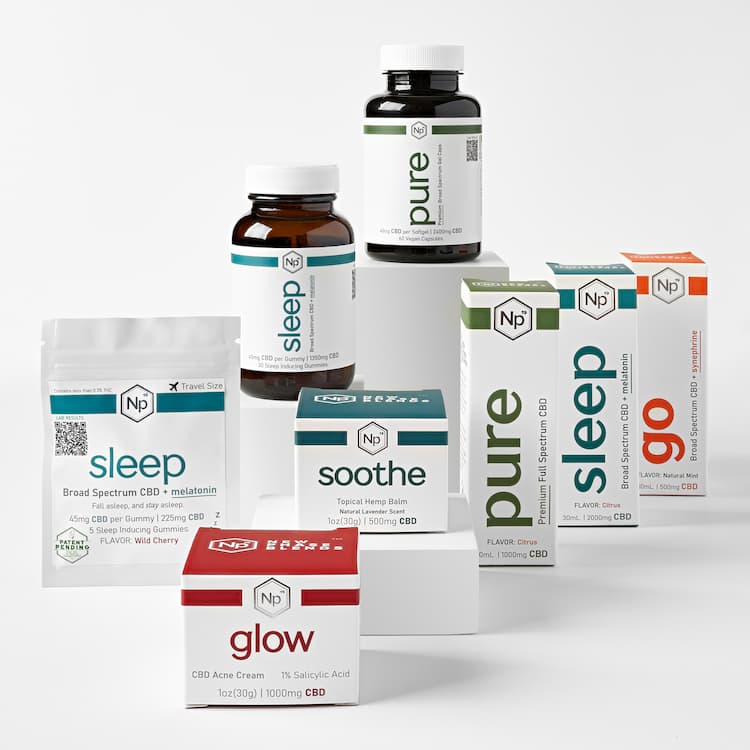Cannabinol (CBN) oil has emerged as a notable product in the hemp-derived wellness market, particularly for those seeking natural sleep support. As interest in alternative cannabinoids grows beyond CBD, many consumers are curious about CBN’s potential benefits and applications. This comprehensive guide explores what CBN oil is, how it differs from other cannabinoids, its potential benefits, and important considerations before incorporating it into your wellness routine.
What is CBN Oil?
CBN oil is a hemp-derived product containing cannabinol, a naturally occurring cannabinoid that forms when THC ages and oxidizes. Unlike its precursor THC (tetrahydrocannabinol), CBN is non-intoxicating, meaning it doesn’t produce the characteristic “high” associated with cannabis consumption.

CBN is considered a minor cannabinoid because it appears in much smaller quantities compared to major cannabinoids like CBD or THC. The aging process that creates CBN happens when:
- Cannabis or hemp plants are exposed to oxygen over time
- THC degrades naturally through exposure to heat and light
- THCA (tetrahydrocannabinolic acid) converts to CBN through oxidation
Most commercial CBN oils contain this compound suspended in a carrier oil (typically MCT oil) to improve absorption and bioavailability. These products may be full-spectrum (containing multiple cannabinoids), broad-spectrum (multiple cannabinoids without THC), or CBN isolate (pure CBN).
The Endocannabinoid System and CBN
To understand how CBN works, it’s helpful to understand the endocannabinoid system (ECS)—a complex cell-signaling network throughout the human body. The ECS regulates numerous functions including:
- Sleep cycles
- Mood regulation
- Immune response
- Pain perception
- Appetite control
CBN interacts with the body’s endocannabinoid receptors, particularly CB1 receptors (found primarily in the central nervous system) and CB2 receptors (predominantly in the peripheral nervous system and immune cells). Though research is still emerging, these interactions appear to influence the body’s natural regulatory processes.
CBN Oil vs. CBD Oil: Key Differences
Many consumers familiar with CBD (cannabidiol) wonder how CBN compares. Here are the primary differences:
| Aspect | CBN Oil | CBD Oil |
|---|---|---|
| Origin | Forms when THC degrades and oxidizes | Directly synthesized in the plant from CBDA |
| Availability | Less common, lower natural concentrations | Widely available, higher natural concentrations |
| Research Status | Limited studies, emerging research | Extensive research, FDA-approved applications |
| Primary Reported Benefits | Sleep support, potential sedative properties | Anxiety relief, pain management, epilepsy treatment |
| Cost | Generally more expensive due to scarcity | More affordable due to market saturation |
| Psychoactivity | Non-intoxicating | Non-intoxicating |
While both cannabinoids share some similarities in their effects—particularly regarding inflammation and pain relief—they appear to have different primary applications. CBN has gained attention specifically for its potential sleep-enhancing properties, while CBD offers broader applications for general wellness.
Potential Benefits of CBN Oil
Sleep Support: The Primary Appeal
The most frequently cited benefit of CBN is its potential to improve sleep quality. While early research shows promise, it’s important to understand the current evidence:
- A 1975 study by Karniol et al. (Karniol, I. G., Shirakawa, I., Kasinski, N., Pfeferman, A., & Carlini, E. A. (1975). Cannabidiol interferes with the effects of Δ9-tetrahydrocannabinol in man. European Journal of Pharmacology, 28(1), 172-177) suggested CBN has sedative properties, though it only examined five subjects and tested CBN alongside THC.
- Anecdotal evidence from consumers reports improved sleep onset and duration.
- Some researchers theorize that CBN’s sedative reputation may relate to its presence in aged cannabis, which contains multiple sleep-inducing compounds beyond just CBN.
A 2021 observational study by Vigil et al. (Vigil, J. M., Stith, S. S., Diviant, J. P., Brockelman, F., Keeling, K., & Hall, B. (2021). Effectiveness of Raw, Natural Medical Cannabis Flower for Treating Insomnia under Naturalistic Conditions. Medicines, 8(3), 46) found that CBN products, particularly when combined with CBD, showed promise for improving sleep quality in participants with self-reported sleep issues. However, controlled clinical trials are still needed to confirm these effects.

Other Potential Benefits of CBN
While research remains preliminary, several studies suggest CBN may offer additional health benefits:
- Pain Management: A 2019 preclinical study using a rat model found that CBN, especially when combined with CBD, demonstrated analgesic properties that could potentially help with conditions like fibromyalgia and myofascial pain. The combination appeared to act as peripheral analgesics and reduce inflammation.
- Appetite Stimulation: Unlike CBD, which may suppress appetite, preliminary research indicates CBN might stimulate appetite. This could be valuable for individuals experiencing appetite loss due to medical conditions or treatments like chemotherapy.
- Neuroprotective Properties: A 2005 study indicated CBN might delay the onset of amyotrophic lateral sclerosis (ALS) in a rat model, suggesting potential neuroprotective effects.
- Antibacterial Activity: Research published in 2008 found that CBN exhibited antibacterial properties against MRSA (methicillin-resistant Staphylococcus aureus), suggesting potential applications against antibiotic-resistant bacteria.
- Anti-inflammatory Effects: Like many cannabinoids, CBN appears to possess anti-inflammatory properties that may help with inflammatory conditions, though specific applications require further research.
It’s crucial to note that most of these studies were conducted in laboratory settings or animal models, and human clinical trials are necessary to confirm these potential benefits and determine effective dosages.
Safety Considerations and Potential Side Effects
While CBN appears to be generally well-tolerated, the limited research means we don’t have comprehensive data on potential side effects. Based on available information and similarities to other cannabinoids, users should be aware of:
Possible Side Effects
- Drowsiness (especially at higher doses)
- Dry mouth
- Changes in appetite
- Potential drug interactions
Drug Interactions
Like CBD, CBN may interact with medications metabolized by the cytochrome P450 enzyme system in the liver. Potential interactions include:
- Blood thinners (warfarin, heparin)
- Heart rhythm medications
- Immunosuppressants
- Anticonvulsants
- Some antidepressants and anti-anxiety medications
- Pain medications
- Antibiotics
- Cholesterol-lowering medications
Important: Always consult with a healthcare provider before adding CBN oil to your regimen, especially if you take prescription medications or have underlying health conditions.
Who Should Avoid CBN Oil
Certain populations should exercise particular caution or avoid CBN products entirely:
- Pregnant or breastfeeding women
- Children (unless specifically recommended by a healthcare provider)
- Individuals with liver conditions
- People with a history of substance use disorders
- Those with scheduled drug tests (as some full-spectrum products may contain trace THC)
How to Choose High-Quality CBN Oil
The quality and efficacy of CBN oil products vary significantly between manufacturers. Here are essential factors to consider when selecting a product:
Third-Party Testing
Reputable CBN oil products should come with a Certificate of Analysis (COA) from an independent, third-party laboratory. This certificate verifies:
- Cannabinoid content and potency
- Absence of contaminants (pesticides, heavy metals, molds)
- THC levels below the legal limit (0.3% in the United States)
Most quality manufacturers provide a QR code on their packaging that leads directly to the product’s lab results.

Extraction Method
The method used to extract CBN impacts the product’s purity and effectiveness:
- CO2 extraction is considered the gold standard, producing clean, high-quality extracts without chemical residues
- Ethanol extraction is also acceptable when properly implemented
- Avoid products using hydrocarbon solvents (butane, hexane) that may leave harmful residues
Source of Hemp
Quality CBN starts with quality hemp. Look for products made from:
- Organically grown hemp (preferably USDA certified organic)
- US or European-grown hemp, which must meet stricter agricultural standards
- Farms with transparent growing practices

Full Formulation Consideration
CBN products come in several formulations:
- Full-spectrum CBN oil: Contains multiple cannabinoids, terpenes, and flavonoids, including trace amounts of THC (less than 0.3%). Many researchers believe the combined effect of these compounds (the “entourage effect”) enhances overall benefits.
- Broad-spectrum CBN oil: Contains multiple cannabinoids and beneficial plant compounds but is THC-free, making it suitable for those concerned about THC exposure.
- CBN isolate: Contains pure CBN without other cannabinoids or compounds. While this provides precise dosing of CBN alone, it may not offer the synergistic benefits of full or broad-spectrum products.
For sleep support specifically, many experts recommend full or broad-spectrum products that combine CBN with complementary cannabinoids and terpenes.

How to Use CBN Oil Effectively
Dosage Guidelines
Because CBN research remains limited, there are no standardized dosing protocols. However, general guidelines suggest:
- Starting with a low dose (5-10mg of CBN)
- Gradually increasing until desired effects are achieved
- Taking CBN approximately 30-60 minutes before bedtime for sleep support
Individual responses vary based on factors including:
- Body weight and metabolism
- Endocannabinoid system sensitivity
- Overall health status
- Other medications or supplements being taken
Administration Methods
CBN oil can be taken several ways:
- Sublingual administration: Place drops under the tongue and hold for 60-90 seconds before swallowing. This method allows for faster absorption through the sublingual blood vessels.
- Oral ingestion: Swallowing CBN oil directly or adding it to food/beverages. While convenient, this method results in slower onset as the compound must pass through the digestive system.
- CBN-infused edibles: Gummies, capsules, and other edible products offer pre-measured doses and may be more palatable for some users.
For sleep benefits specifically, timing is important—most users report taking CBN approximately 30-60 minutes before bedtime.
Legal Status of CBN Oil
The legal status of CBN oil in the United States falls under regulations established by the 2018 Farm Bill, which legalized hemp and hemp-derived products containing less than 0.3% THC by dry weight.
Under these regulations, CBN derived from legally grown hemp is federally legal, provided the final product contains less than 0.3% THC. However, individual state laws may vary, and some states have implemented additional restrictions.
International regulations concerning CBN vary significantly by country. Before purchasing or traveling with CBN products, it’s essential to verify current laws in your jurisdiction.
Real-World Applications: When to Consider CBN Oil
Based on current research and user experiences, CBN oil may be worth considering for:
Sleep Support
If you experience occasional sleep difficulties and prefer natural alternatives to conventional sleep aids, CBN oil might be worth exploring. Many users report:
- Reduced time to fall asleep
- Fewer nighttime awakenings
- More refreshed feeling upon waking
A 2021 consumer survey found that among CBN users, approximately 73% reported improved sleep quality, with effects typically noticed within the first week of consistent use.
Complementary Support for Pain Management
For individuals dealing with chronic pain conditions who find incomplete relief from CBD alone, adding CBN might provide additional benefits through different receptor interactions. Some pain specialists have begun recommending combination products for patients seeking comprehensive cannabinoid therapy.
Situations When Traditional Options Haven’t Helped
Some individuals turn to CBN after finding limited success with:
- Over-the-counter sleep aids
- CBD products for sleep
- Lifestyle modifications alone
Conclusion: Is CBN Oil Right for You?
CBN oil shows promise as a natural sleep aid and potential wellness supplement, particularly for those seeking alternatives to conventional sleep medications. However, several important considerations should inform your decision:
- Research status: While preliminary studies and anecdotal evidence are encouraging, comprehensive human clinical trials on CBN’s effects remain limited.
- Individual variation: Responses to cannabinoids vary significantly between individuals. What works exceptionally well for one person may have minimal effects for another.
- Quality matters: The benefits of CBN depend greatly on product quality, formulation, and proper dosing.
- Medical guidance: Consulting with a healthcare provider knowledgeable about cannabinoids is strongly recommended, especially for those with existing health conditions or taking medications.
If you decide to try CBN oil for sleep or other potential benefits, approach it as part of a comprehensive wellness strategy that includes proper sleep hygiene, stress management, and appropriate medical care.
FAQs About CBN Oil
Q: Will CBN oil make me feel high?
A: No, CBN is non-intoxicating and doesn’t produce the psychoactive effects associated with THC. However, some full-spectrum CBN products contain trace amounts of THC (less than 0.3%), which shouldn’t cause intoxication but might theoretically enhance CBN’s effects through the entourage effect.
Q: How quickly does CBN oil work for sleep?
A: When taken sublingually (under the tongue), CBN oil typically begins working within 15-30 minutes. When ingested orally, effects may take 45-90 minutes to become noticeable. Individual experiences vary based on metabolism, dosage, and product formulation.
Q: Can I take CBN oil with other sleep supplements?
A: CBN may be safely combined with certain natural sleep aids like melatonin—in fact, many commercial products combine these ingredients. However, consult a healthcare provider before combining CBN with prescription sleep medications or multiple supplements.
Q: Will CBN oil appear on a drug test?
A: Pure CBN isolate shouldn’t trigger a positive drug test for THC. However, full-spectrum CBN products containing trace THC might potentially trigger a positive result on sensitive drug tests. If drug testing is a concern, opt for broad-spectrum or isolate products verified THC-free through third-party testing.
Q: How should I store my CBN oil?
A: Store CBN oil in a cool, dark place away from direct sunlight and heat sources. Most products come in amber glass bottles to protect against light degradation. Refrigeration isn’t necessary but may help preserve freshness for extended periods.
Disclaimer: This article is for informational purposes only and does not constitute medical advice. Consult with a qualified healthcare provider before beginning any supplement regimen, particularly if you have existing health conditions or take medications.











